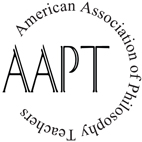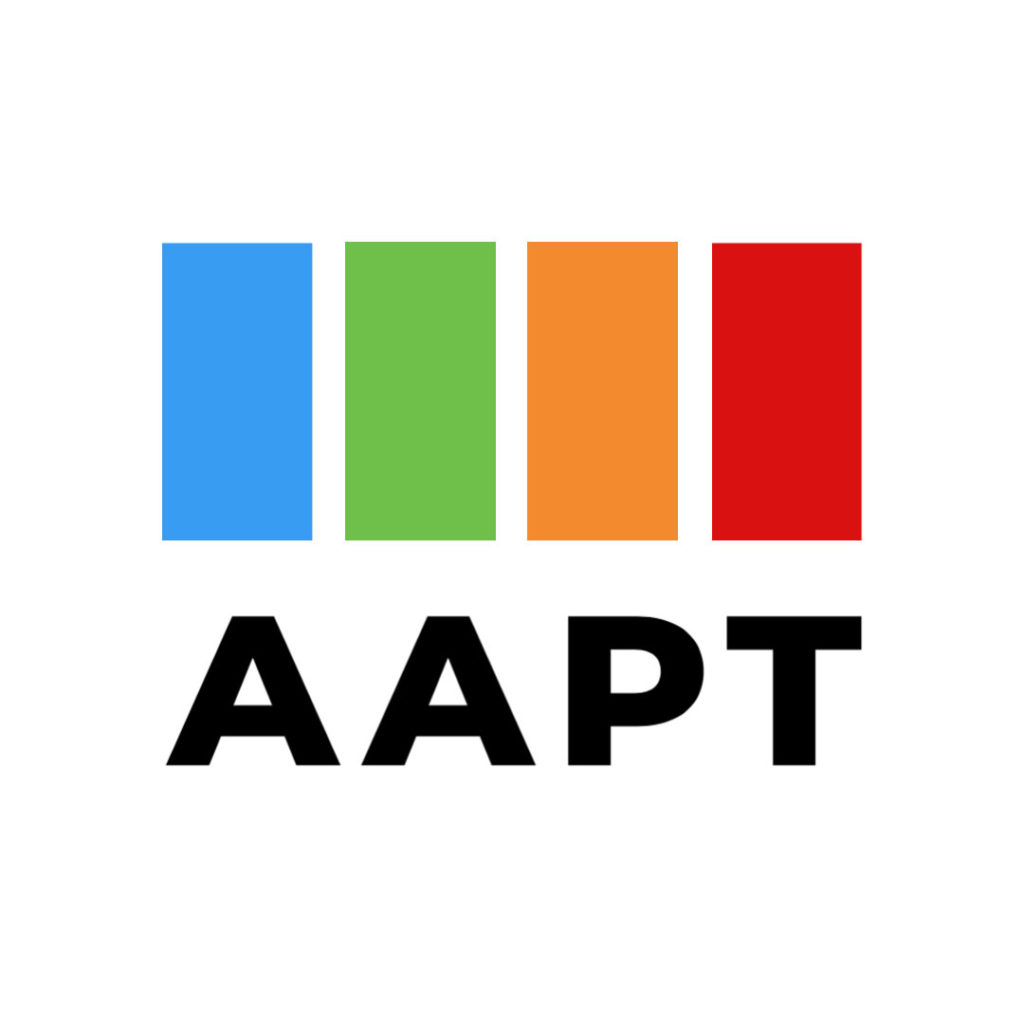Introducing AAPT Studies v.1
The first volume of American Association of Philosophy Teachers Studies in Pedagogy is now available. The theme and subtitle of this volume is Practices in Pedagogy. The volume was edited by Emily Esch and Charles W. Wright.
- The list of contents is available here.
Here is an introduction to and brief reflections on the volume by Wright:
Reflections on the Unexpected Avenues
of Inquiry Opened by Teaching Philosophy
Charles W. Wright
Co-editor, AAPT Studies in Pedagogy, v.1
Though I’m co-editor of this first issue of the AAPT Studies in Pedagogy, I’m a newcomer to the AAPT. I’ve been teaching philosophy for a good couple of decades (depending on how one measures), and I’ve known about the AAPT a good portion of that time, but my scholarly attention to matters of pedagogy has until fairly recently been consumed by my responsibilities as the Assessment Coordinator for the Department of Philosophy at the College of St. Benedict and St. John’s University. Instead of AAPT related events, I attended assessment conferences.
I ended up as co-editor largely because my assessment work had caught the attention of my colleague, Emily Esch, who as the Executive Director of the AAPT scarcely requires introduction. She knew I was interested in good teaching and understood that the question I was investigating concerned how we might obtain credible evidence that it was taking place. When announcements about the 2014 AAPT conference/workshop came my way, I shared with her that I was interested but also not sure that my assessment work be a good fit with the mission of the AAPT. Emily assured me that it would be and encouraged me to submit a proposal. I am extremely glad I did. Once the conference was over she approached me with the idea of collaborating with her on an edited volume.
Now that I’ve had the opportunity to become closely acquainted with the work of over a dozen members of the AAPT, I’d like to share a few thoughts about some striking features of the work found in the collection.
Philosophical-Pedagogical Intersections
Perhaps it surprises nobody who has been associated with the AAPT for any length of time, but I found it quite fascinating to see how philosophy teaching gives rise to intriguing philosophical issues in its own right. In one example, J. Alden Stout and Chris Weigel consider the pedagogical implications of the different kinds of biases examined by social psychologists and experimental philosophers. Given that one of the tasks of teaching philosophy is to improve students’ reasoning abilities, and given that such improvement involves (among other things) reducing the biases in students’ reasoning, they quite reasonably wonder whether these different biases call for different pedagogical treatment.
Another pedagogical question every philosophy teacher must address concerns whether or not they ought to make their own philosophical commitments known to their students. Kristin Schaupp first reminds us of the two rough camps most of us are familiar with – the advocates of value neutrality and the defenders of full disclosure. But what, she asks, if we consider this debate in light of current work in the epistemology of disagreement? How might worries about the rationality of disagreement between epistemic peers bear on the defensibility of either of the pedagogical positions?
A third instance in which careful attention to issues of philosophical pedagogy intersects with significant disciplinary issues is to be found in Daryl Close’s discussion of teaching logic. Candidly, I’m hesitant to say anything here because I don’t know anything about logic! Having gotten my degree at one of the Continental outposts in the U.S. (Stony Brook), I was able to escape with only a beginning undergraduate understanding of logic. Nonetheless, I can tell that his recommendations for teaching logic are based not just on long experience in the classroom but also on careful consideration of specific issues in logic that appear to have dogged the discipline for over half a century. His suggestion is that one’s understanding of the relations between indirect and conditional proofs and the treatment of quantification rules makes a significant difference for how one might go about teaching logic.
Engaging Research and Scholarship
A second noteworthy feature of many pieces in the collection is the considerable knowledge that many of the contributors demonstrate in relation to the Scholarship of Teaching and Learning and about educational research more generally. Kimberly Van Orman, for instance, offers a detailed introduction to the practice of team based learning – a method that enables students to use course concepts to solve meaningful problems, and that also retains the benefits of student group work while managing to eliminate most problems associated with this technique. Her discussion regularly references research showing how such learning is particularly attractive to students because they see how practical it can be.
Another piece with deep roots in educational research, by Paul and Linda Neiman, tackles the business of getting students to engage seriously with philosophical writing. The authors present a series of reading exercises that facilitate students’ efforts to decode a text, thereby reinforcing their sense of competence. I attended the authors’ workshop at the 2014 AAPT meeting and (with quite a number of others) saw immediately how useful their strategies could be. Readers impressed by their approach will be encouraged to know that they are at work on a monograph that will present an extensive array of such exercises, each of which embodies pedagogical insights derived from educational research literature.
In his discussion of course participation, Jessey Wright draws upon an extensive literature investigating active learning and course participation to demonstrate not just what good instructors intuitively understand, which is that students who engage in active learning perform better, but also that class participation is a culturally specific and learned behavior. He argues that an adequate conception of course participation should account for cultural differences in students’ learning styles and accommodate forms of participation that don’t simply consist in speaking up in class.
Another question with which every instructor of philosophy must struggle is how to motivate students to learn when they come to your class for any number of reasons other than because they want to learn philosophy. Paul Green offers us a useful synopsis of the educational research that addresses the question of student motivation. The key, he informs us, is to abandon traditional approaches that rely on rewards and punishments and instead to implement class procedures that help students to discover that mastery of the material is feasible, that the material itself is worth mastering, and that the classroom environment supports their learning.
Pedagogical Creativity
“Creative” is probably not the first descriptor that comes to mind to in relation to philosophers – likely not in our self-understanding and certainly not in the understanding of your average undergraduate. Yet several of the pieces included in the collection show that when philosophy teachers put their minds to it, they come up with some remarkably creative ideas about how to make philosophy a living endeavor for their students. Theodore Bach, for instance, makes the New York Times the centerpiece of his classes – calling a good newspaper (a category that he freely acknowledge will include more than just the Times) “a philosophical playground and a philosophical training ground.” What I find to be especially exciting about his approach is the way it allows philosophy to “go live,” showing students how the concepts they are studying offered real and vital insight into daily life – and on a daily basis!
It is cliché to identify philosophy as the paradigm case of the “life of the mind” that is so much a part of the liberal arts tradition, but there is probably some truth in the idea that philosophy is often taught as a kind of disembodied knowledge. For that reason I find Brett Gaul’s essay particularly refreshing. In it he shares his experiences with using hands on learning activities to aid students in their understanding of philosophical concepts. This bit of creative pedagogy strikes me as a prescient application of recent insights (found in many disciplines) into the role of embodied experience in the development of human cognition.
For those who are versed in the digital domain (and perhaps even for those who aren’t), Christina Hendricks offers an exploration into the many ways online resources and communities can support both an instructor’s own development as well as the design of courses – along with a rich abundance of linked references to relevant online resources. Teaching “in the open,” she also emphasizes, includes not just open source materials but an approach to teaching that maximizes student participation in the educational process. In its emphasis upon student engagement, the open learning she endorses bears a notable resemblance to the team-based model outlined by Van Orman and sharply underscores Wright’s suggestion that course participation means a lot more than just talking in class.
One contributor even turns course assessments on their heads. The time honored function for quizzes, it goes almost without saying, is as small scale summative evaluations of student achievement. In his essay Andrew Winters points out that such assessments foster short term, instrumentally oriented learning while what philosophy teachers are really interested in is to promote long term learning and life skills. To support these ends he has developed a delightfully perverse (and effective!) method of “guided unsuccessful retrieval” (in other words, quizzes administered before students can be reasonably be expected to be “prepared”) that reminds students of what they do not know and thereby reinforces valuable intellectual skills.
Radical Traditionalists
One of the oldest aspirations of philosophy is to aid in the emancipation of the human spirit and moral transformation of the person. The last feature of the collection that I’d like to draw attention to was the wholly unexpected but welcome discovery that several of the contributions were thoroughly infused by this traditional spirit. Leslie Miller’s account of his campaign against intellectual zombies is the most overt member of this caucus. In his classes philosophy becomes a disciplined practice of self-examination that liberates students from the unconscious cognitive blinders that keep them in ignorance of who they really are (and might be). In his hands, the therapeutic potential latent in the study of philosophy is brought to robust fruition.
In her account of an adventurous course in the philosophy of education, Francis Bottenberg describes how she and her co-instructor sought to awaken their students’ sense of agency and ownership over their learning by transferring to them certain authority normally kept in the hands of an instructor – grading policy, for instance. She recounts how the instructors also underwent their own schooling as they discovered that students did not necessarily welcome a genuine effort at power sharing.
While philosophy has been animated by transformative aspirations, some contributors highlighted how the discipline itself now struggles with its own unacknowledged (or only partially acknowledged) blinkers. Christine Wieseler, in particular, shows how a failure to take seriously the perspective of people with impairments shapes philosophical reasoning in biomedical ethics textbooks. Her contribution describes how she helps her students recognize not just the ablest assumptions structuring the philosophical analyses but also the way these assumptions have limited their moral and epistemological imagination.
The last of this group of radical traditionalists is Monique Whitaker, who sees in the gender and racial homogeneity of Western philosophy a call for disciplinary transformation. Motivated not just by concern to reach all the students in her classes, but also by the conviction that the current cultural homogeneity of philosophy is harmful to the discipline itself, she describes how she has adjusted the reading lists in her syllabi and added a number of counter-cultural pedagogical practices in an attempt to make the experience of learning philosophy more accessible to all her students. She suggests that by such small steps, each of us can make a contribution to a reformation of the discipline that will extend further the transformative potential of philosophy.
It was an honor to have the opportunity to work with the contributors to the first issue of AAPT Studies in Pedagogy. I am impressed by the depth and creativity of the thought that they invested in their craft. I am also grateful to them for the generosity of spirit they showed in response to Emily’s and my comments and suggestions for revision to their work. I had heard reports about what a very collegial group the members of the AAPT are. Working with contributors to the collection as well as with Emily allowed me to discover for myself the truth of these reports.


